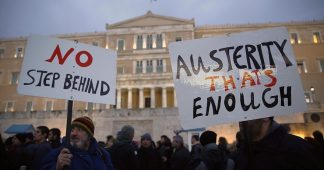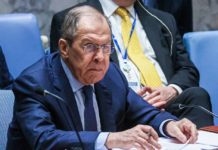by Eric Toussaint
25 October 2020
“When I came to the Bank, we were not allowed to mention the word ‘corruption’. It was called the “c” word. Well, maybe we need to mention the “r” word which is ‘rights’”
James Wolfensohn, 1 March 2004
The question of “human rights” has never been a priority concern for the World Bank. Among the conditionalities fixed by the Bank, one right supercedes all others: the individual right to private property, which in practice works to the advantage of big property holders, whether they be wealthy individuals or national and transnational corporations. In the conditionalities supported by the World Bank, there is no reference to the collective rights of peoples and individuals.
If there is any consideration of human rights within the World Bank, it is not in the progressive sense expressed in the seminal documents of the United Nations. Evidently, ideologies like to interpret the concept of rights in their own specific way.
As Jean-Philippe Peemans so accurately points out: “In any case, from the currently predominant western perspective, human rights are seen first and foremost as concerning individual freedom of action, non-interference in private business, the right to dispose freely of property, and above all, the obligation of the State to refrain from any act that violates the individual freedom to invest time, capital and resources in production and exchange … For neo-liberals, social and cultural demands can be seen as legitimate aspirations, but never as rights … the neo-liberal view rejects any collective approach to the question of rights. The individual is the only entity capable of demanding rights, and even those who violate rights are necessarily individuals who must take full responsibility for their actions. The violation of rights cannot be attributed to organizations or to structures” [1]. The World Bank, like the IMF, takes refuge in this postulate to divest itself of all responsibility in terms of respect for economic, social and cultural rights. Yet these rights are inseparable from civil and political rights: it is impossible to respect individual rights if collective rights are not taken into account. As multilateral institutions, the World Bank and the IMF are bound by the application of international treaties and the rights, both individual and collective, that are declared therein.
Transparency and good governance are standards that apply to all. The international financial institutions demand them from the governments of indebted countries, but feel free to ignore them when it comes to their own affairs. The obligation to evaluate and report on actions taken should not be limited to States but also extend to the private sector, and even more importantly, to the sphere of international organizations, since their activities, policies and programmes have a major impact on human rights [2]. Structural adjustment programmes have such negative consequences for economic, social and cultural rights (particularly among the most vulnerable), as well as for the environment, that these institutions should be obliged to account for their actions.
Structural adjustment is no respecter of human rights
In spite of the international texts that provide the legal framework for the protection of human rights, the IMF and the World Bank “operate according to the logic of private financial enterprise and world capitalism, with little consideration for the social and political consequences of their actions” [3].
The Common Report, presented to the United Nations Commission on Human Rights by the Special Reporter and an independent Expert, states: “For almost 20 years, the international financial institutions and the governments of creditor countries have played an ambiguous and destructive game which consists of remote-controlling the economies of the Third World and imposing unpopular economic policies on powerless countries, on the pretext that the bitter pill of macro-economic adjustment will in the end allow these countries to achieve prosperity and freedom from debt. After two decades, many countries are worse off than when they brought in the structural adjustment programmes enforced by the IMF and the World Bank. These drastically austere programmes have exacted a high social and ecological price and in many countries the human development index has taken a dramatic plunge” [4].
The Report firmly recalls that “the exercise of the basic rights of the people of debtor countries to food, lodging, clothing, employment, education, health services and a healthy environment cannot be subordinated to the application of structural adjustment policies and economic reforms related to the debt …” [5].
Yet the policies enforced by the IFI subordinate the respect for human rights and the legitimacy of governments to the dogmatic application of their programmes [6]. In practice, these structural adjustment programmes go beyond “the simple enforcement of a set of macro-economic measures at the domestic level. They [are] the expression of a political project, a deliberate strategy of social transformation on a global scale, whose aim is to make the whole planet a playing field in which transnational corporations will be able to operate with total impunity. In other words, the structural adjustment programmes (SAPs) act as a “transmission belt” to facilitate a globalization process that is based on liberalization, deregulation and diminishment of the State’s role in national development” [7].
The United Nations Commission on Human Rights also pointed out that structural adjustment policies have serious repercussions on the ability of developing countries to implement national development policies whose prime objective is to respect human rights, and particularly economic, social and cultural rights, through improved living standards for local populations [8].
According to the Report of Bernard Muhdo, an independent Expert, structural adjustment programmes – the result of a policy knowingly devised and applied by the directors of the IMF and the World Bank – have extremely negative consequences on economic, social and cultural rights, especially [9] in matters of health, education, access to drinking water, food safety, etc. [10] The Expert also notes that the policies pursued by the IFI have been disputed by citizens through protest movements that have been brutally repressed by governments and public authorities to ensure the success of programmes imposed by these institutions (privatization of water, privatization of power, privatization of public transport, privatization of hospitals, unrestricted prices for medicines, bread and other basic necessities, protection of the interests of transnational corporations in the matter of investments and appropriation of common natural resources, etc.). Consequently there is a close link between the massive violation of economic, social and cultural rights and the massive violation of civil and political rights.
Having seen that the public authorities of the States concerned were committing violations, the IMF and the World Bank should have reminded them of their international obligations regarding the protection of civil and political rights and human rights in general. Instead of blocking or suspending the measures undertaken, these institutions continued to apply even more energetically. Such indifference and cynicism is bluntly revealed in a statement made at the meeting of the independent Expert with the IMF directors: “… for the IMF, to block a programme for reasons of human rights violations was unwise” [11].
A priori, this is a very serious state of affairs: these institutions behave as if they are bound by no international obligations whatever, unless they be linked to trade or investment agreements. But of course the underlying objective is clear. In 1999, the independent Expert designated by the Commission on Human Rights accurately identified the globalization process and the role of the financial institutions as being part of the “neo-liberal counter-revolution” [12].
In international law, whether contractual or customary [13], there are basic or fundamental legal principles and rules governing the international protection of human rights and whose scope extends to all subjects of international law.
States, international financial institutions and private interests
The World Bank and the IMF are not abstractions. The decisions emanating from these institutions are taken by flesh-and-blood men, and sometimes women, who act on behalf of their States or groups of States. The States are themselves indisputably bound by the United Nations documents. The member States of the World Bank and the IMF are therefore, like all others, bound by the legal respect for human rights in the decisions they take.
One can pursue this even further. In the globalization process, thanks to the actions of transnational corporations, the G8 and the international financial institutions [14], the national and local public authorities have been deliberately deprived of their powers in economic and social matters. The States intervene more and more frequently to ensure that private interests are served instead of ensuring the full enjoyment of human rights. For the World Bank, the whole problem of under-development and poverty boils down to the fact that the public authorities interfere too much in social and economic affairs, often hindering the actions and business of the private sector. This is confirmed in a document entitled Private Sector Development, in which the President of the World Bank states that “growth driven by the private sector is essential to sustainable development and the reduction of poverty” [15].
The international financial institutions blame the States, yet in the report submitted to the United National General Assembly, the UN Secretary General affirms: “There is a general tendency today to ask Governments to carry too many responsibilities, without acknowledging that the old-fashioned view of the State’s role in development is no longer valid; because of globalization, national Governments no longer have the same tools or resources at their disposal as they once had. Yet, while no mention is made of international responsibilities, or the role played by the current political system and the system of governance in the modern world, responsibilities which these systems do have, Governments are blamed for issues, difficulties and problems that are primarily created in the international arena. This kind of approach is neither objective nor fair, especially to developing countries, which have very little say in the fundamental decisions taken on the international stage and yet are blamed for hampering the development process, while underlying international inequities go unmentioned …” [16] (Author’s underlining).
It is therefore a fundamental error to consider the States as being alone responsible for human rights violations during the application of multilateral trade rules or following the application of measures enforced by the IMF and the World Bank [17].
Yet this thesis is widely disseminated within the IMF and the World Bank: the real villains in the human rights story are the member States – taken individually – because it is they who finally decide on the policies these institutions must apply.
This denial of responsibility is unacceptable in international law.
The IMF, the World Bank and the WTO are above all International Organizations [18] in the strict sense of the term. As such, they possess an international legal personality [19], they have their own bodies [20], they are given jurisdiction by the treaty or basic agreement (absolute jurisdiction) [21]. Most important, as international organizations they have rights and duties.
It goes without saying that no serious body, no international organization which claims to act as a subject of international law, no international organization which intends to have jurisdiction and an international legal personality can reasonably argue that it is excused from international obligations, especially those governing the protection of human rights [22]. As a subject of international law, any and all international organizations are bound by this same international law, including the rules governing the protection of human rights [23].
The Universal Declaration of Human Rights
Incorporated in the body of customary law, the Universal Declaration of Human Rights is, as its name implies, universal; it binds the States and the other subjects of international law in the exercise of their specific actions and their responsibilities. No international organization can hide behind its rules of procedure to avoid having to respect the international agreements ratified by its members [24].
International institutions therefore have a duty to create conditions favourable to the full enjoyment of all human rights, as well as to the respect, protection and promotion of these rights. However, structural adjustment programmes, as shown above, diverge in practice from this theory. Today re-named “anti-poverty strategies”, they stipulate that economic growth will in itself bring about development, a tenet that is contradicted by, among others, the annual reports of the United Nations Development Programme (UNDP). This so-called economic growth, as proposed by the international financial institutions, benefits mainly the most privileged classes and increases the Third World countries’ state of dependency even further [25]. In addition, economic growth as it is actually practised is fundamentally incompatible with the preservation of the environment.
The Declaration on the Right to Development
This view of development, relentlessly maintained by the World Bank in spite of its patent failures, is incompatible with a text as laudable and eminently social as the Declaration on the Right to Development adopted by the United Nations in 1986 [26]:
Article 1: 1. The right to development is an unalienable human right …
Article 1: 2. The human right to development implies the full realization of the right of peoples to self-determination, which includes (…) the exercise of their inalienable right to full sovereignty over all their natural wealth and resources.
Article 3: 2. The realization of the right to development requires full respect for the principles of international law …
Article 8: 1. States should undertake, at the national level, all necessary measures for the realization of the right to development … Appropriate economic and social reforms should be carried out with a view to eradicating all social injustices.
It was in March 1981 that the United Nations Human Rights Commission proposed to the Economic and Social Council to set up the first working group on the right to development. This group met a dozen or more times during the 1980s [27], with the result that Resolution 41/128 of the UN General Assembly was adopted on 4 December 1986, subsequently to be known as the Declaration on the Right to Development. “Only one country dared vote against it: the United States, on the pretext that this Declaration was confused and imprecise, and rejecting the link between development and disarmament as well as the very idea of a transfer of resources from the developed North to the under-developed South. Eight countries abstained: Denmark, Finland, Federal Germany, Iceland, Israel, Japan, Sweden and Great Britain, insisting on the precedence of individual rights over the rights of peoples and refusing to consider development aid as an obligation under international law” [28].
The Charter of the United Nations and specialized agencies
Although it is a resolution of the United Nations General Assembly, in practice the Declaration on the Right to Development does not have the binding force of international treaties. But other texts can play this role: the Charter of the United Nations (Preamble, paragraph 3 of Article 1 and Articles 55 and 56) is not only the constituent document of the United Nations, but also an international treaty that codifies the fundamental principles of international relations. The two pacts on civil and political rights are also normative texts related to the right to development: all the rights stated in these pacts form part of the content of the right to development [29].
The principal texts of the United Nations concern both individual rights and collective rights, the right to development and the right of the States to political and economic sovereignty. In practice however, not only the World Bank but also the IMF, the WTO and transnational corporations have consistently refused to comply with their terms.
Until now, these institutions have been able to enjoy impunity on an alarming scale, because despite some interesting advances, present law is far from perfect. Of course there are instruments and jurisdictions to deal with individual human rights and crimes against humanity, but other crimes that claim numerous victims throughout the world – economic crimes – are not at the present time subject to any internation jurisdiction, agreement or international definition.
The World Bank, a specialized agency of the United Nations
Yet in fact, the World Bank corresponds to the United Nations definition of one of the “specialized agencies established by intergovernmental agreement and having wide international responsibilities, as defined in their basic instruments, in economic, social, cultural, educational, health, and related fields …”. Thus defined, the World Bank is linked to the United Nations system through the Economic and Social Council (known by the abbreviation ECOSOC, which acts under the authority of the General Assembly), as per Article 57 paragraph 1 of the Charter of the United Nations.
The UN system is based on international cooperation, and more especially on international economic and social cooperation.
Under Article 55, with a view to the creation of conditions of stability and well-being which are necessary for peaceful and friendly relations among nations based on respect for the principle of equal rights and self-determination of peoples, the United Nations shall promote:
a. higher standards of living, full employment, and conditions of economic and social progress and development;
b. solutions of international economic, social, health, and related problems; and international and cultural cooperation;
c. universal respect for, and observance of, human rights and fundamental freedoms for all, without distinction as to race, sex, language, or religion.
The entire United Nations system is based on the following principles:
- sovereign equality for all its Members.
- Members must in good faith fulfil the obligations they have undertaken by the terms of the Charter.
Consequently, from a historic viewpoint and contrary to their pronouncements, the IMF and the World Bank are specialized agencies of the United Nations. As such, they are bound by the United Nations Charter.
Given this fact, it is impossible to evade the question: are the World Bank and the IMF legally bound to respect the obligations laid down in the United Nations Charter, including the obligation to respect human rights?
The International Court of Justice (ICJ) clearly ruled on this in the cases of Barcelone Traction and East Timor [30]: the articles of the World Bank are permeated with the obligations implied by customary law, in particular erga omnes obligations and jus cogens laws. These obligations, also called imperative law, mean that the rules of international law, whatever their nature, are always legally binding, and that their violation has specific legal consequences with regard to their corresponding obligations and rights. Among these, for example, are the principle of the sovereign equality of States, the prohibition of the use of force, of torture, of the forced disappearance of persons, all of which are imperative obligations. The jus cogens laws are an integral part of international public order from which no subject is exempt, whether or not he has ratified international treaties or agreements. The erga omnes obligations, very close to jus cogens, concern, as the International Court of Justice has noted, the legal obligation (or more specifically the obligation of prevention and repression) applicable to all subjects of international law, given the importance of the rights at stake, to protect these rights, and in particular the obligation to respect and ensure the respect of human rights at all times and in all circumstances.
While it is true that the World Bank and the IMF are independent of the UN at the operational level, it is nevertheless their duty to respect human rights and customary law in general.
The international financial institutions must incorporate this obligation in the implementation of their policies: no subject of international law can escape these obligations by invoking the absence of an explicit mandate or on the pretext of “non-politicization”, or even less by a restrictive interpretation of economic, social and cultural rights as being less binding than civil and political rights.
This last aspect has been effectively stressed by Eric David who states, as regards the laws applying to the IFI, that: “the rights more specifically affected by a situation of economic and social deterioration are economic, social and cultural rights. Such a situation in fact threatens the enjoyment of these rights by categories of the population in varying, but usually large proportions. It is not an exaggeration to say that situations of extreme poverty lead to a violation of practically all economic, social and cultural rights …” [31].
He continues: “…if the rights affected by the SAPs are principally economic and social rights, the case also arises where, by a knock-on effect, the violation of these rights also leads to violation of the civil and political rights of the people concerned” [32].
Conclusion
Neither the World Bank nor the IMF should be able to invoke their “constitutional right” in order to shirk their obligations to protect human rights, using the pretext that their decisions must be guided by economic considerations only.
It cannot be too emphatically stated: the policies pursued by the Bretton Woods institutions, whose field of action is planetary, have direct repercussions on the lives and fundamental rights of all peoples [33].
Eric Toussaint is the President of the CADTM Belgium (Committee for the Abolition of the Third World Debt), and author of Your Money or Your Life. The Tyranny of Global Finance, Haymarket Books, Chicago, 2005, 487 pp; co-author with Damien Millet of The Debt Scam, VAK Publication, Mumbai, 2003 and Who Owes Who? 50 Questions about World Debt, Zedbooks, London, 2004; co-author with Damien Millet of Tsunami Aid or Debt Cancellation! The Political Economy of Post Tsunami Reconstruction, VAK Publication, Mumbai, 2005.
The author wishes to thank Hugo Ruiz Diaz Balbuena, whose work has been one of the main sources of inspiration in the writing of this chapter. Of particular importance is the study entitled “Les politiques menées par les IFI et leur responsabilité pour les violations massives des droits humains suite à l’imposition des programmes d’ajustement structurel”, (IFI policies and their responsibility for the massive violations of human rights following the enforcement of structural adjustment programmes), 3 October 2004, 15 p.
Translated by Judith Harris
- The World Bank: an ABC
- The International Monetary Fund (IMF): an ABC
- Concerning the founding of the Bretton Woods’ Institutions
- The WB assists those in power in a witch-hunting context
- Early conflicts between the UN and the World Bank/IMF tandem
- SUNFED versus World Bank
- Why the Marshall Plan ?
- Why the 1953 cancellation of German debt won’t be reproduced for Greece and Developing Countries
- Domination of the United States on the World Bank
- World Bank and IMF support to dictatorships
- The World Bank and the Philippines
- The World Bank’s support of the dictatorship in Turkey (1980-1983)
- The World Bank and the IMF in Indonesia: an emblematic interference
- Theoretical lies of the World Bank
- The South Korean miracle is exposed
- The debt trap
- The World Bank saw the debt crisis looming
- The Mexican debt crisis and the World Bank
- The World Bank and the IMF: the creditors’ bailiffs
- Presidents Barber Conable and Lewis Preston (1986-1995)
- James Wolfensohn switches on the charm (1995-2005)
- The Meltzer Commission on the IFI at the US Congress in 2000
- The World Bank’s accounts
- From Paul Wolfowitz (2005-2007) to David Malpass (2019-…): the US President’s men control the World Bank
- World Bank and IMF: 76 Years is Enough! Abolition!
- The World Bank, the IMF and the respect of human rights
Footnotes
[1] PEEMANS, Jean-Philippe (2002). Le développement des peuples face à la modernisation du monde, Louvain-la-Neuve/Paris, Academia Bruylant/L’Harmattan, 2002, p. 349
[2] Angulo Sanchez, Nicolas. 2005. El Derecho Humano al Desarollo frente a la mundialización del Mercado, p. 145
[3] Benchikh M, Charvin R., Demichel F., Introduction critique au Droit international public, Collection Critique du droit, Presse Universitaires de Lyon, 1986, p. 12.
[4] UN-CHR, Debt relief and local investment: coordination between the HIPC (Highly Indebted Poor Countries) Initiative, Common Report by Ronaldo Figueredo (Special Reporter) and Fantu Cheru, (independent Expert), 14 January 2000, E/CN.4/2000/51, =paragraph 1.
[5] Idem, paragraph 5.
[6] Notably, the massive impoverishment of entire strata of populations in Third World countries. We should recall that poverty is considered “ … as being a state of denial, even of violation, of human rights”. Cf., UN-CHR, Implementation of the right to development in the present global context. Examination of the sixth report of the independent Expert on the Right to development, E/CN.4/2004.18/4, 17 February 2004, paragraph 12.
[7] UN-CHR, Effects of structural adjustment policies on the full enjoyment of human rights, Report by the independent Expert Mr. Fantu Cheru, E/CN.4/1999/50, paragraph 31.
[8] Consecuencias de las políticas de ajuste económico originadas por la deuda externa en el goce efectivo de los derechos humanos y, especialmente, en la aplicación de la Declaración sobre el derecho al desarrollo, Resolución de la Comisión de Derechos Humanos 1999/22.
[9] The massive and constant violation of economic, social and cultural rights is indissociable from the entire body of human rights because this violation usually goes hand in hand with serious violations of civil and political rights. Cf. Fierens, Jacques, “La violation des droits civils et politiques comme conséquence de la violation des droits économiques, sociaux et culturels”, Institutions financières, l’exception aux droits humains, Centre de droit international de l’Université libre de Bruxelles, December 1998, Revue belge de droit international, 1991-1.
[10] UN-CHR, Effects of structural adjustment policies and foreign debt on the full enjoyment of human rights, especially economic, social and cultural rights, E/CN.4/2003/10, paragraph 42.
[11] UN-CHR, Fourth report by the independent Expert Mr. Arjun Sengupta, E/CN.4/2002/WG.18/2/Add. 1, 5 March 2002, paragraph 21.
[12] UN-CHR, Effects of structural adjustment policies on the full enjoyment of human rights, Report by the independent Expert Mr. Fantu Cheru, E/CN.4/1999/50, paragraph 28-30.
[13] Contractual law is written law, the rules of which are contained in international agreements, such as the International Pact on Economic, Social and Cultural Rights. Customary law is unwritten law which is binding, such as the prohibition of crimes against humanity, crimes of aggression, non-intervention, the rights of peoples to their natural resources, etc.
[14] Alejandro Teitelbaum describes them as “instruments and representatives of the major powers and big capital …”. See Teitelbaum A., El Papel de las sociedades transnacionales en el mundo contemporáneo, AAJ, Producciones Gráficas, Buenos Aires, 2003, p. 104.
[15] Note by the President of the World Bank, 28 September 2004. Quoted by Hugo Ruiz Diaz Balbuena in IFI policies and their responsibility for the massive violations of human right following the enforcement of structural adjustment programmes, 3 October 2004, 15 p.
[16] GA/UN, Human rights questions: human rights questions, including alternative approaches for improving the effective enjoyment of human rights and fundamental freedoms. Globalization and its impact on the full enjoyment of human rights, Report of the Secretary General, 7.08.2003, par. 16- 17
[17] Making only the States responsible is, in practice “to hold the executing entities responsible while the main institutions that are in charge of the adoption of these policies enjoy full impunity …”. Cf. UN-CHR, Globalization and its effects on the full enjoyment of human rights, E/CN.4/Su.2/2003/14, par. 37. Not underlined in the document.
[18] See Ridruejo, J.A.P., Cours général de Droit international public, Recueil des Cours de l’Académie de Droit international (RCADI), 1998, tome 274, p. 193-198.
[19] Cf. CIJ, Réparation des dommages subis au service des Nations Unies (Affaire Bernadotte), Recueil, 1949, p. 174.
[20] Verhoeven J., Droit international public, Précis de la Faculté de Droit de l’UCL, Larcier, Bruxelles, 2000, p. 205.
[21] Combacau J., Sur S., Droit international public, Montchrestien, Paris, 1995, second edition, p. 731-732
[22] E/CN.4/Su.2/2003/14,par. 37.
[23] Dupuy, P.M., Droit international public, Dalloz, Paris, 1995, third edition, p. 115.
[24] Massiah, Gustave in Cetim. 2005. ONU. Droits pour tous ou loi du plus fort ?, p. 404-405
[25] Angulo Sanchez, Nicolas. 2005. El Derecho Humano al Desarollo frente a la mundialización del Mercado, p. 16
[26] The full text of the Declaration: http://www.ohchr.org/english/law/rtd.htm
[27] The 1980s are a paradoxical decade. During this period we see the birth of a potentially marvellous legal instrument on the global level with the adoption of the Declaration on the Right to Development. It is also one of the most negative decades in terms of human rights and the right to development as a result of the explosion of the debt crisis, deteriorating trade terms, the widening equality gap between the countries of the Centre and the countries of the Periphery, and between people within each country.
[28] Angulo Sanchez, Nicolas. 2005. El Derecho Humano al Desarollo frente a la mundialización del Mercado, p. 36-37
[29] Idem, p. 288
[30] ICJ, Yearbook 1970 and ICJ, Yearbook 1996.
[31] David E, « Conclusions de l’atelier juridique: les institutions financières internationales et le droit international », Les institutions financières internationales et le droit international, ULB, Bruylant, Bruxelles, 1999, § 2.
[32] Idem, § 4.
[33] Cf. UN-CHR, The effects of structural adjustment policies and foreign debt on the full enjoyment of all human rights, in particular economic, social and cultural rights, E/CN.4/2003/10. Analysis of the case of Bolivia.
He is the author of Debt System (Haymarket books, Chicago, 2019), Bankocracy (2015); The Life and Crimes of an Exemplary Man (2014); Glance in the Rear View Mirror. Neoliberal Ideology From its Origins to the Present, Haymarket books, Chicago, 2012 (see here), etc.
See his bibliography: https://en.wikipedia.org/wiki/%C3%89ric_Toussaint
He co-authored World debt figures 2015 with Pierre Gottiniaux, Daniel Munevar and Antonio Sanabria (2015); and with Damien Millet Debt, the IMF, and the World Bank: Sixty Questions, Sixty Answers, Monthly Review Books, New York, 2010. He was the scientific coordinator of the Greek Truth Commission on Public Debt from April 2015 to November 2015.
Published at https://www.cadtm.org/The-World-Bank-the-IMF-and-the-respect-of-human-rights











